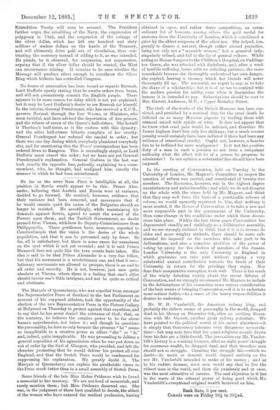Mr. W. H. Vanderbilt, the American railway king, and probably
the richest owner of personalty in the world, dropped dead in his library on December 8th, after an exciting discus- sion with Mr. Garrett, another great railway potentate. We have pointed to the political moral of his career elsewhere—it is simply that Democracy tolerates even dangerous accumula- tions—but may note hero that the quasi-religious morals drawn from his fate are a little flaccid. The journalists say Mr. Vander- bilt's history is a warning because, after an eight years' struggle for enormous wealth, he dropped dead, and that therefore men should not so struggle. Granting the struggle fair—which we doubt—its merit or demerit would depend entirely on the use Mr. Vanderbilt intended to make of his money ; and as to his sudden decease, most men would say that to live the richest man in the world, and then die painlessly and at once, was the most attractive of careers. The real objection to it lies in the waste of the colossal power of doing good which Mr. Vanderbilt's exceptional original wealth bestowed on him.


















































 Previous page
Previous page